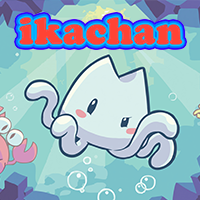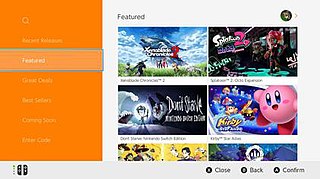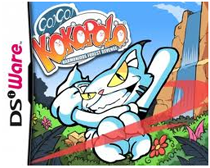Shin'en Multimedia is a German independent video game developer. Based in Munich, the company was founded in 1999 by former members of the demoscene group Abyss and is an official third-party developer for Nintendo. They develop games primarily for the Nintendo Switch, some non-Nintendo platforms such as the PlayStation 4, and previously for the Wii U, Wii, Nintendo 3DS, Nintendo DS, Game Boy Advance, and Game Boy Color.
WayForward Technologies, Inc. is an American independent video game developer and publisher based in Valencia, California. Founded in March 1990 by technology entrepreneur Voldi Way, WayForward started by developing games for consoles such as the Super NES and Sega Genesis, as well as TV games and PC educational software. In 1997, they relaunched their video games arm, placing the company as a contractor for publishers and working on a variety of licensed assets.

Toki Tori is a puzzle video game with platform elements, released by Capcom in September 2001 for the Game Boy Color. It was developed by Dutch video game development company Two Tribes and is their first published video game. The game follows a young chick, Toki Tori, and his quest to rescue his younger siblings, still in their eggs. To progress through the game, the player must pick up each egg on a level using a set number of tools, with new tools being introduced as the player progresses through the four worlds. This usually involves careful planning and creative thinking.

Ikachan (いかちゃん) is a freeware video game created by Japanese developer Daisuke Amaya, under the art name Pixel. In the game, the player plays a squid named Ikachan, who swims through a cave, meeting and helping other creatures. The game was later released by Nicalis for the Nintendo 3DS eShop on January 31, 2013. On November 30, 2016, Japanese publisher Pikii released the game on the Japanese eShop.

Bomberman Blast is an action game developed and published by Hudson Soft for the Wii and WiiWare as part of the Bomberman franchise. The game was released as two versions: a fully featured retail release and a WiiWare version known as Wi-Fi 8-Nin Battle Bomberman. The retail version was released in Japan on September 25, 2008, while the WiiWare version was released on September 30, 2008. The WiiWare version was released in Europe on September 12, 2008, and in North America on September 29, 2008.

Fun! Fun! Minigolf is a minigolf video game developed and published by Shin'en Multimedia for the Wii's WiiWare and Nintendo 3DS' Nintendo eShop digital distribution services. It was first released in North America on December 22, 2008, and later in PAL regions on January 2, 2009 and in Japan on February 17, 2009.

Pokémon Rumble is a beat 'em up video game in the Pokémon series for WiiWare developed by Ambrella and published by The Pokémon Company and Nintendo.

Mario & Sonic at the London 2012 Olympic Games is a 2011 crossover sports and party game developed by Sega Japan. It was published by Nintendo in Japan and Korea and by Sega elsewhere. As the third instalment in the Mario & Sonic series, it was released on the Wii on 15 November 2011 in North America, 18 November 2011 in Europe, and 26 December 2011 in Japan. It was also released for the Nintendo 3DS in February 2012. Mario & Sonic is the official video game of the 2012 Summer Olympics and is licensed by the International Olympic Committee through exclusive licensee International Sports Multimedia. The game is the only Wii title to come in a yellow keep case.

The Nintendo eShop is a digital distribution service for the Nintendo Switch, and formerly available via the Nintendo Network for the Wii U and Nintendo 3DS. The eShop was first launched in June 2011 on the Nintendo 3DS via a system update that added the functionality to the HOME Menu. It is the successor to both the Wii Shop Channel and DSi Shop. Unlike on the Nintendo 3DS, the eShop was made available on the launch date of the Wii U, although a system update is required in order to access it. It is also a multitasking application, which means it is easily accessible even when a game is already running in the background through the system software, though this feature is exclusive to the Wii U and the Nintendo Switch. The Nintendo eShop features downloadable games, demos, applications, streaming videos, consumer rating feedback, and other information on upcoming game releases.

Go! Go! Kokopolo – Harmonious Forest Revenge is an action puzzle platform video game developed and published by Tanukii Studios Limited for the Nintendo DSi's DSiWare digital distribution service. It was first announced in October 2008 as a title under development for the Nintendo DS, in a series of Developers Diaries in the UK video game magazine NGamer. It was eventually released on the DSiWare service on August 4, 2011 in the PAL region, August 11, 2011 in North America, and May 30, 2012 in Japan. The game was removed on August 31, 2014.

Mutant Mudds is a platform video game developed by Renegade Kid. Players control Max and Granny as they combat the titular invaders following a meteorite crash. The game was first released as a Nintendo 3DS eShop exclusive in 2012, and arrived on Microsoft Windows and iOS in 2012. An enhanced version of the game, titled Mutant Mudds Deluxe, was released in 2013 for Wii U and Microsoft Windows, and in 2016 for PlayStation Vita and PlayStation 4. The Nintendo 3DS version was updated as the enhanced version in 2014.

Nano Assault Neo is a twin-stick multidirectional shooter developed and published by Shin'en Multimedia and released on the Nintendo eShop for the Wii U. It was a launch title for the system on 18 November 2012 in North America, and in PAL regions on 30 November 2012. It was released in Japan on 27 February 2013 by Arc System Works. It is the sequel to the 2011 Nintendo 3DS game Nano Assault.

Mario vs. Donkey Kong is a crossover spin-off video game series of both the Mario and Donkey Kong franchises, based on puzzle platforming, marking the return of Pauline and the rivalry between Mario and Donkey Kong.
Heavy Fire is a series of on-rails arcade shooter video games developed by Polish video game developer Teyon between 2010 and 2013 and Anshar from 2018 to present. The series includes five games: Heavy Fire: Special Operations (2010), Heavy Fire: Black Arms (2011), Heavy Fire: Afghanistan (2011), Heavy Fire: Shattered Spear (2013), and Heavy Fire: Red Shadow (2018).

Fast Racing League is a racing game developed and published by German video game developer Shin'en Multimedia and released for Wii as a WiiWare title on 27 May 2011. It is the first installment in the Fast series.

Art of Balance is a physics-based puzzle video game developed and published by Shin'en Multimedia. The game was originally released on WiiWare in 2010, then enhanced in high definition and ported to the Wii U's and Nintendo Switch's eShop in 2013 and 2018, respectively, and PlayStation 4's PlayStation Store in 2016. A version with touch controls was also ported to the Nintendo 3DS's eShop in 2012, titled Art of Balance TOUCH!

Go! Go! Kokopolo 3D: Space Recipe for Disaster is a 2017 action puzzle platform video game, and sequel to the 2011 DSiWare game Go! Go! Kokopolo: Harmonious Forest Revenge. Developed by Tanukii Studios Limited, and published by Circle Entertainment, the game features 80 new stages, 10 new bosses, a completely new story, as well as other bonus modes and secrets.

Cooking Mama is a video game series and media franchise owned by Cooking Mama Limited. The series is a cookery simulation-styled minigame compilation of many video games and adventures for Nintendo gaming platforms. Generally, the gameplay revolves around performing different kitchen tasks, through the instructions of "Mama", to cook various meals. The series so far consists of five main games on Nintendo DS and Nintendo 3DS, two spin-offs on Wii, two spin offs on DS, and a spin off on 3DS. It also spins off into the Gardening Mama series. The original Cooking Mama game was also ported to iOS. A sixth main series game, Cooking Mama: Cookstar, was released for the Nintendo Switch and PlayStation 4 in 2021.
Fast is a series of racing video games developed by German game developer Shin'en Multimedia. Released exclusively for Nintendo platforms, the series consists of three games, all following the same racing and phase-shifting formula, Fast Racing League, Fast Racing Neo, and Fast RMX.














